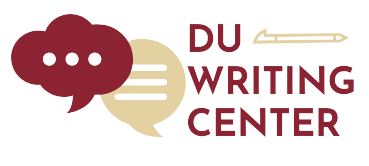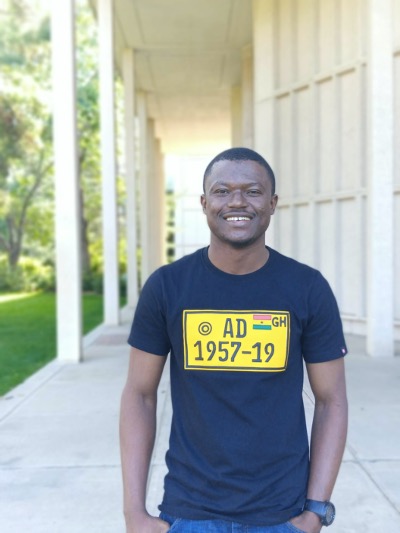by Kamila Kinyon
This spring, we will be publishing a series of spotlight articles about multilingual students at DU. These articles are based on interviews that Kamila Kinyon conducted about students’ memories of becoming multilingual, their connection to their heritage language, and their experiences at DU. This project is funded by a 4D Infusion Grant awarded for 2022-23 to Juli Parrish and Kamila Kinyon. We welcome this opportunity to celebrate DU’s multilingual speakers and writers.
A speaker of four indigenous languages and multiple dialects, Dinko Hanaan Dinko is graduating from DU this spring with a PhD in Geography. For his dissertation addressing water rights in Ghana, he did fieldwork with informants where multilingualism was essential. In addition to English, Dinko speaks Kusaal, Twi, Mampruli, and Hausa. He has used all these languages in his ethnographic research. Kusaal, his native language, has multiple dialects that he switches between depending on his research participant.
Dinko comes from the northeastern part of Ghana, a multi-ethnic, multilingual space where it is common for the next village to speak a different language: “I grew up in a setting where I had to learn multiple languages at a very, very young age, because in school we speak English but also speak multiple languages from the local dialects.” Dinko’s father speaks about seven languages, including English and his native language of Kusaal, and his mother speaks about four. Several family members, including his mother and grandmother, do not speak English, although English serves as the lingua franca in Ghana.
At school, Dinko experienced the repercussions of living in a post-colonial society. At the time he went through the school system in the 1990’s, it was still common for students to be punished for speaking English: “In the 1990’s, teachers were allowed to use the cane in class, so you could get some lashes. Additionally, they actually recruited students to spy on each other. So, you had a class captain…write down names of those who spoke local languages.” Fortunately, schools in Ghana today no longer use these practices. Despite the association of English with a colonial past, Dinko notes that the people of Ghana still value it, since it is the language of power and access.
After completing his schooling in Ghana, Dinko did research in several countries including Germany, Norway, and Rwanda. He received an MA in Geography and International Development, and then came to DU to work with Dr. Hanson Nyantakyi-Frimpong for his PhD. In the U.S., Dinko finds that the largest linguistic difficulty is speaking. While his English writing is fluent, he has trouble with the semantics and pronunciation of American English. However, Dinko has had predominantly good experiences at DU concerning support for international students. For instance, although he sometimes wishes people would better understand the struggles of those whose native language is not English, he praises the Writing Center for having “a great team if English is your second language or third language.”
As a multilingual writer, Dinko sometimes finds it challenging representing his research in English, especially since some phrases and idioms are untranslatable. For example, when he was conducting research for his dissertation in Kusaal, one of his research participants said that when you don’t have access to water you develop a lot of anger, and you can’t do anything but eat your anger. When Dinko googled “eating anger” it translated into English as an eating disorder, while this woman meant to say you have to endure pain from not having water. These are the types of nuances that need to be explained to readers in an ethnographic text.
This is how Dinko encapsulates the assets of speaking more than one language: “Multilingualism makes you see the world in more complicated ways. I see the world through the eyes of my grandmother who speaks my local language and is able to make certain expressions.” He stresses the importance of escaping the “flat anglophone perspective” since “it’s more exciting…to switch thinking in English and thinking in (his) native language.” For these reasons, Dinko concludes: “I will encourage people to learn more than one language.”

